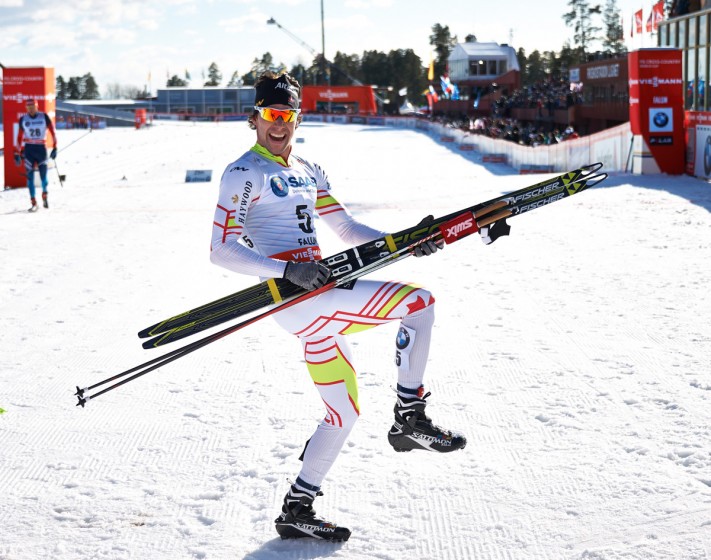
Thirty kilometers is a long time to get to know somebody, and when you’re already pretty well aquatinted, well, then it comes down to mind games.
Canada’s Alex Harvey knew he’d be better off following the lead of three others for the first half of the men’s 30-kilometer skiathlon — the classic portion — at World Cup Finals on Saturday. Plenty of kick made it easy for him to stay in contact on what he considered his weakness: the big, steep hill, known as Mörderbacken in Falun, Sweden.
The men had to ascend it eight times total — four loops of classic, four loops of skate. Harvey stayed comfortable behind Sweden’s Daniel Richardsson, Norway’s Martin Johnsrud Sundby, and Russia’s Alexander Legkov, entering the transition in fourth and emerging out of it in first.
Everybody else was at least 21 seconds behind, and not a threat according to Harvey. Even when Finland’s Matti Heikkinen started to go for it in early in the skate leg, leading the chase pack in an effort to close the gap on the four leaders, Sundby, Legkov and Harvey kept it cool, even “chill,” Harvey said.
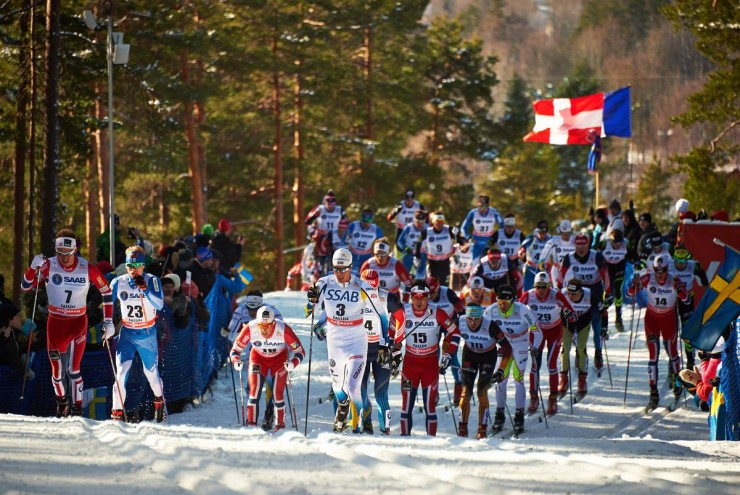
Meanwhile, Richardsson, who initiated the breakaway with a relentless double pole about 5 k in, started to falter. With 10 1/2 k to go, he was trying to minimize a gap of his own to the front three. Harvey was surprised the Swede fell off the pace, but said Richardsson, who turned 32 on Saturday, pulled their weight for most of the classic leg, and he’s known as a better classic skier.
And then there were three. The breakaway trio stuck together for the rest of the race, never looking back to see where Heikkinen was (he lost steam about 5 k into the skate leg), and not worrying about the chase pack, which included the likes of Devon Kershaw — who led its charge halfway through 9 k into classic portion.
The front four had gapped the masses between 5 and 6 k; there was still plenty of race ahead of them, yet they skied smart enough to put more time into the chase group in the skate leg.
With 10 k to go, France’s Jean-Marc Gaillard was leading the pack in fifth, 36 seconds behind the leaders. No way was he or anyone else going to bridge 30-plus seconds alone, let alone into a headwind, Harvey thought.
So it was the Canadian, Norwegian and Russian — all essentially guaranteed a podium in the penultimate race of World Cup Finals, but everyone wanted to win.
After the transition, Sundby led up the long gradual climb out of the stadium, just like he did on every other lap, and the others let him do so into the headwind on a windy, above-freezing afternoon. Harvey decided it was time to take his turn up front soon after, not so much for courtesy but strategic reasons.
“I was leading on the climb just because I wanted to set my own pace,” he said. “I didn’t know how the other guys were [feeling] and I felt like the most vulnerable place for me it always is uphills. It was the best position to react on the front.”
And so he led up Mörderbacken — every time.
Throughout the next four laps, the pace remained somewhat relaxed, even lulling at times. Harvey said he wasn’t worried about Legkov or Sundby attacking the last time up Mörderbacken because he had a sense everyone was pretty gassed at that point.
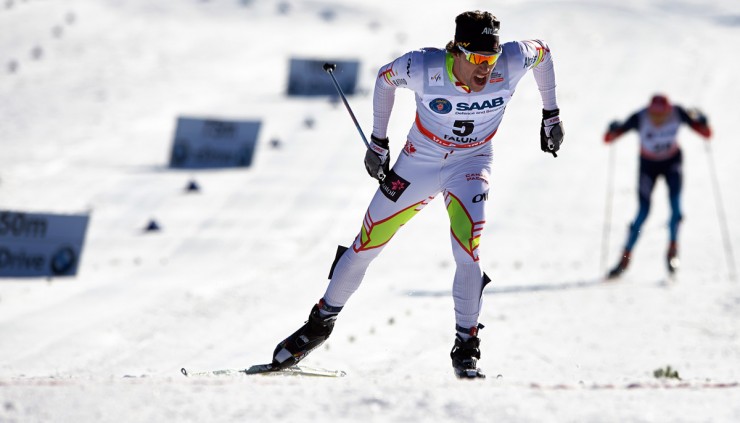
Harvey got up front anyway, skiing up the middle of the long climb to minimize the amount of space anyone would have to use to get around him. If anything, their pace slowed, with Richardsson as the next closest competitor 19 seconds back.
By the final uphill 180-degree turn, Harvey almost came to a stop in first — all part of the plan, he later explained. Canadian Head Coach Justin Wadsworth was relieved.
“I was worried he was leading so much,” Wadsworth said. “I told him that after the race, ‘Oh man, you had me worried you were going to lead down the last downhill,’ which was I think on this course, a bit of a curse. … He just put on the brakes at the last second … and I was really happy to see that, because when he did that I knew he had a lot of confidence in his skis and his body.”
Just like Harvey guessed, Legkov went for the open space and Harvey went from first to third, remembering the value of the slipstream on the last downhill into the stadium. The Canadian had gone from sixth to fourth with a similar tactic in Friday’s classic-sprint final, and this time, he was going to use it to ski to a victory.
“I knew my skate skis were good all day, [and] Legkov and Sundby, they’re not the strongest sprinters,” Harvey said.
Sundby had two skate-sprint podiums at the Tour de Ski and won the Kuusamo mini tour at the beginning of the season, and considering that, Harvey thought he would the toughest to beat in a sprint. Really though, he just wanted to enter the stadium in second or third — didn’t matter which order.
With a couple hundred meters to go, Harvey took advantage of a narrow opening between Sundby on the left and Legkov on the right to follow Sundby toward the finish in second. While Harvey followed the course’s natural line to the right behind Sundby, he said Legkov moved left into his path and he broke the Russian’s pole as a result.
“I tried to stay in Sundby’s draft because Legkov was so sketchy today,” Harvey said, noting Legkov crashed three times (once classic skiing out of the stadium, another time at the classic-bonus prime and one more up Mörderbacken — all on his own).
While Sundby and Harvey dueled to the finish, Legkov skied alone in third, finishing 5.9 seconds back. The Canadian pushed up and over the last rise to the line, edging Sundby — the overall World Cup champion — by 0.4 seconds to win in 1:18.07.6.
Sundby later told Harvey in doping control that he was in contention for a World Cup overall podium, which he hadn’t realized and would be a career best. Harvey will have to hold off Sundby and Legkov, who will start 26 seconds behind him in Sunday’s 15 k freestyle pursuit, to win the World Cup Finals mini tour and claim 200 points that comes with it (and would put him ahead of Norway’s Chris Andre Jespersen in third in the overall standings).
But on Saturday, Harvey took some time to celebrate his third World Cup victory of the season, yelling exuberantly with a final “Yes!” at the finish, and getting congrats from his teammate Devon Kershaw, who had one of his best races of the season in 12th.
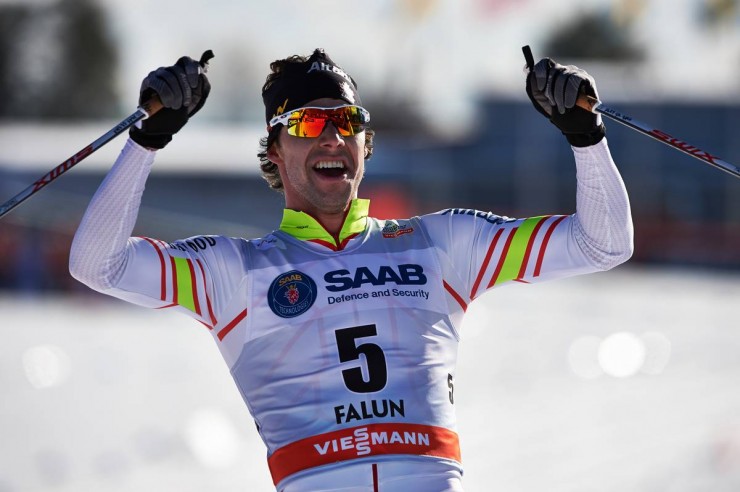
“I enjoyed it right after the race, on the podium and everything, it was pretty sweet,” Harvey said. “It’s been such a good season for me with three wins. The skiathlon, since I’ve been a junior, it’s always been my favorite race. It took me a while to get good at sprinting.”
Wadsworth said Harvey will probably have to be in the top two Sunday to secure third in the overall World Cup.
“After the year we have had, for him to end up third overall tomorrow, it just shows that Alex is a guy for the future, that he can contend for the overall World Cup,” Wadsworth said. “We are playing on such a different field as North Americans because we have to deal with being on the road all year long. I don’t think people really put enough weight into that. For Alex to rebound after a hard Olympics and difficult races here and there, and we have been living out of a hotel since November, I think it really, really speaks strongly to the quality all-around skier that he is.”
While the 25-year-old Harvey acknowledged that every season has its highs and lows, he felt fortunate that his didn’t have many. His health was good, he didn’t get sick or injured, he pulled out of one race at the Olympics to save energy for other races, and while the Olympics were marked by some waxing woes, he said there were plenty of non-race-related things in Sochi to focus on.
“We controlled the things that we could control and we came into the season with a good plan,” Harvey said. “The body was there every weekend except [the first one in] Kuusamo. I’ve had a lot of fun this year, just always fighting for the top 10. It went by really fast there … it was just high spirits the whole winter.”
Before this season, Harvey had one career World Cup win. He went on to win the first prologue stage of the Tour de Ski in Oberhof, Germany, and then a World Cup skate sprint in Szlarska Poreba, Poland.
If he wins tomorrow, great, Harvey said. Twenty-six seconds is a lot of time to start ahead of anyone else, and if Sundby and Legkov charge hard enough to catch him, then he might find himself in a similar position as Saturday — trying to outsmart and outsprint them to the finish.
“The optimal plan is to stay away, but Plan B isn’t bad either,” Harvey said.
While Kershaw came through in 12th, 1:13.7 behind Harvey, the third Canadian in the race, Ivan Babikov placed 23rd (+3:42).
“It’s cool to see that he’s back in the top 15,” Harvey said of Kershaw. “There was nothing free today. It was windy. It was a slow 30 k. An hour and 18 is not fast.”
Wadsworth said Kershaw’s result didn’t surprise him.
“Devon, when he gets in the situation where he doesn’t have anything to lose … he was relaxed today and I think our skis were quite good,” Wadsworth said. “He just went out there and did what he normally could do, that is the kind of shape he is in. It was nice for him to just turn things off and put it on auto pilot.”
On Friday, Kershaw placed 40th in the sprint, which he described in an email as “another hard effort in a long list of hard efforts on the sprint front this season.”
“I was and am very disappointed with how my sprint season went this year,” Kershaw wrote. “I only qualified in 2 individual sprints (Oberhof skate sprint, and Poland) and got bumped in the 1/4 finals in each of those – so that’s a long cry from being on the podium in both classic and skate sprints like I have been back in 2011 and 2012. Something isn’t working – and I guess now it’s safe to say that something didn’t work – as my sprint season is done for this year.”
He explained he’ll have to spend time to figure out what went wrong and how to get back the speed that’s characterized most of his career. “This is the first season in awhile where I have no top 10 sprint results on the World Cup,” Kershaw wrote.
“I am not feeling very good – I mean, that’s pretty evident. I got pretty sick in Sochi, and then in Lahti I was still not 100% there either, but went for it by racing both races – which didn’t go well,” he added. “I have since been healthy, but my lungs are holding on to something – I could feel that a lot in the qualifier for sure. Still though, skiing around easy I don’t feel too bad, just feels like my top end is non-existent.”
His goals for the rest of World Cup Finals, “to have a distance race where I feel half-decent,” Kershaw wrote. He likely did that on Saturday.
Babikov recently returned to Europe after going back to Canada for a week to recover from illness post-Sochi. He said his skis felt a bit draggy in Saturday’s classic portion and his legs weren’t quite there in skating, but all things considered, he felt reasonably good, skiing with American Noah Hoffman and Norway’s Sjur Røthe until late in the skate leg. They dropped him with at least one lap to go and he skied alone for the rest of the race.
“That is the end of the season usually, everybody races with whatever they have in the tank,” Babikov said.
On Sunday, he’ll start 25th with Russia’s Evgeniy Belov in 24th, 5:13 behind Harvey. They have about a 50-second gap to 22nd.
“Of course I will try to ski as fast as I can,” he said.
As for his teammate: “Alex is on fire lately, he is in great shape and having the best season for him ever,” Babikov said. “It was great to see him win today, well, I did not see that, but I saw him in the finish.”
— Matt Voisin contributed reporting
Alex Kochon
Alex Kochon (alexkochon@gmail.com) is a former FasterSkier editor and roving reporter who never really lost touch with the nordic scene. A freelance writer, editor, and outdoor-loving mom of two, she lives in northeastern New York and enjoys adventuring in the Adirondacks. She shares her passion for sports and recreation as the co-founder of "Ride On! Mountain Bike Trail Guide" and a sales and content contributor at Curated.com. When she's not skiing or chasing her kids around, Alex assists authors as a production and marketing coordinator for iPub Global Connection.


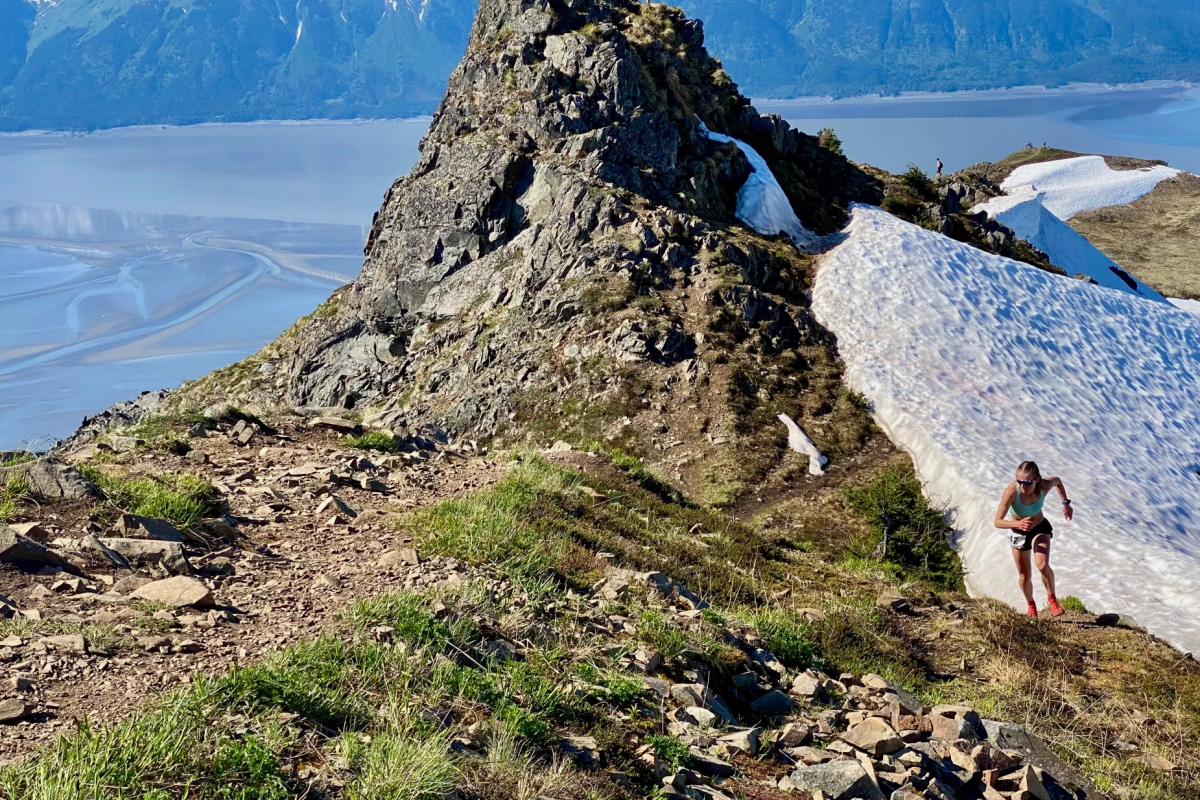

11 comments
John Forrest Tomlinson
March 15, 2014 at 8:32 pm
Harvey looked so cool and collected toward the end of that. Super.
highstream
March 15, 2014 at 8:40 pm
Season of a lifetime?? His good results have all come in the past few weeks. Before that, it was one of his worst.
T.Eastman
March 15, 2014 at 10:13 pm
Thanks for being the downer highsteam…
Justin
March 15, 2014 at 10:20 pm
Check the results, highstream. Harvey had a lousy fall (and a disappointing Olympics, as the article notes), but he had four top-5 finishes in Tour stages, and three more top-5’s before the Olympics. He is in his 11th week of racing very well!
Martin Hall
March 15, 2014 at 11:30 pm
2010-11 would in my estimation be his best ever so far—1st in the 30km at the U-23s, Drammen WC sprint 2nd, 1st in team (that’s a gold medal) sprint at the WSC in Oslo and multiple other top 10s thru out the winter—-the other thing, realize this was just a stage race today—less points and less money then if it is a real WC—another great FIS invention, one of my pet peeves.
Really a great win today—I sent Benjamin from SkiTrax an e-mail 10 mins before the start and said Alesx can win this race today—he has too many good things going for him—speed (the big divider in my estimation) does both techniques equally as well and is one of the in race thinkers I’ve seen over the years—big factor. Example—he pulled the last hill today and then stepped over and let Sundby and Legov go by and they led down the hill in the stadium until the came to the uphill at the beginning of the horseshoe and this where Alex started his charge to the finish—he can see them, but they can not see him—so he gets the jump on the acceleration—he wins! Close but the cigar goes to HARVEY—the smart one.
Martin Hall
March 15, 2014 at 11:47 pm
Oh! I forgot to mention like the article above did—like father—like son—Pierre, Alex’s father won on this very same site in 1987 and 1988 just after the Calgary Olympics—both races being skating 30kms and he couldn’t get inside the top 15 in Calgary because of all the doping going on in skiing at that time. Good story about these victories—as the next week he won the 50km in Oslo and put a good whipping on the field.
skidog
March 16, 2014 at 12:28 am
I’m ecstatic about the win and the season and the article was great. …but did I miss something? Does Kershaw’s 2nd place in 2012 not contradict the following statement?:
“in contention for a World Cup overall podium, which he hadn’t realized and would be a career best and historic first for Canada”
John Forrest Tomlinson
March 16, 2014 at 7:49 am
“one of the [best] in race thinkers I’ve seen over the years”
Yes! Really important and great to watch/learn from.
highstream
March 16, 2014 at 3:55 pm
I appreciate Marty’s perspective. Harvey did well this year once he got going, but “season of a lifetime” headline is overblown. Hope he can build on it next year and the Devon comes around again (or retires).
campirecord
March 16, 2014 at 5:20 pm
Alex has had a good all around year, better than before IMO. First, the competition was fierce (The Devon year had a top 3 pull out) and was not an Olympic year. Alex is more constant and I think he has probably received the worst skis ever at the worst time possible. To further overcome a huge challenge, he is based in Quebec and still studies in University (albeit part time), his team mates have been buggered down by terrible results and it takes a hard headed athlete to excel in that environment, a lot of pressure on his shoulders during CCC worst year in a long time and a complete shamble of the women’s team. So yeah, I believe Harvey was stronger than ever and will now remain a constant challenger on any given day.
Now maybe CCC can look at all the energy a certain part of Canada has to deploy (world juniors, nationals) in order to fill 60-70% of the top junior Canadian skiers… If there is one single person out there who can fly back home proud and guiltless, its Alex Harvey… Maybe a few non athletes who got to seriously look in the mirror…
Martin Hall
March 21, 2014 at 1:47 pm
Don’t know who you are—but 60% of what you wrote is uncalled for—-you have a very biased take and this is not fair to the country nor all of the athletes that are on this team—and definitely not fair to Alex. Alex and Devon are big buds and have supported each thru the ups and downs and would both be upset with your statements.
Bad skis—-nobody likes this to happen—but if you really knew anything about xc skiing—you would know this is a team effort–with the athlete being a big part of that team—-he is the last person to step on the skis and give the thumbs up that they are OK.
Until you have been there and done this—-you don’t have a clue what it takes to bring about the perfect skis.
You should be happy that Devon, finally had a couple of races this last weekend to help make it easier getting thru the spring.